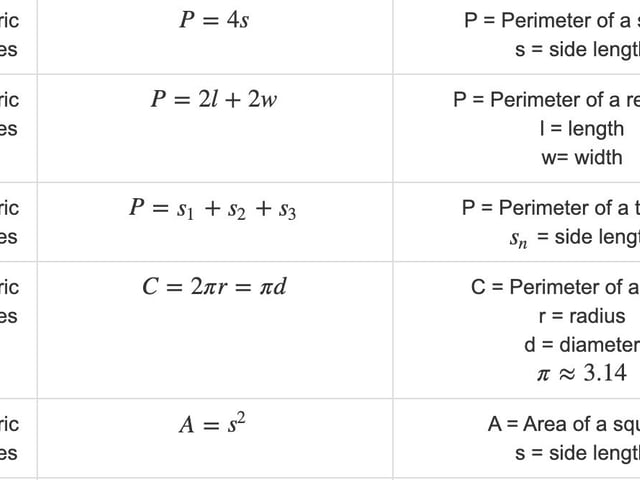
Formulas for the Math Section of the CBEST® Test
There’s ONE single skill you have to master if you want to ace the CBEST® Math test: Reading.
Are you thinking that we are mistaken? Think again. Reading is crucial for solving all the problems you’ll face during the Math Section of the CBEST® Test, because all the questions will be given to you in words, not numbers. Reading skills are also important when studying for the test, since you need to understand the fundamental concepts of math if you want to succeed.
That’s why we have plenty of reading material for you and it’s all FREE. You can read 6 pages of preparatory material here:
Union Test Prep’s Study Guide for the CBEST® Math Section
Or you can browse through these to see how ready you are:
Or, if you are in the mood for light reading, you can check the following formula chart, which has the essential content you need to know before the test. Also use these when accessing our practice questions and flashcards for this test.
Math Formulas for the CBEST
| Category | Formula | Symbols | Comment |
|---|---|---|---|
| Geometric Quantities |
\(P = 4s\) | P = Perimeter of a square s = side length |
|
| Geometric Quantities |
\(P = 2l + 2w\) | P = Perimeter of a rectangle l = length w= width |
|
| Geometric Quantities |
\(P = s_1 + s_2 + s_3\) | P = Perimeter of a triangle \(s_n\) = side length |
|
| Geometric Quantities |
\(C = 2 \pi r = \pi d\) | C = Perimeter of a circle r = radius d = diameter \(\pi \approx 3.14\) |
|
| Geometric Quantities |
\(A = s^2\) | A = Area of a square s = side length |
|
| Geometric Quantities |
\(A = lw\) | A = Area of a rectangle l = length w = width |
|
| Geometric Quantities |
\(A = bh\) | A = Area of a parallelogram b = base h = height |
|
| Geometric Quantities |
\(A = \frac{1}{2} bh\) | A = Area of a triangle b = base h = height |
|
| Geometric Quantities |
\(A = h \cdot \dfrac{b_1 + b_2}{2}\) | A = Area of a trapezoid \(b_n\) = base n h = height |
|
| Geometric Quantities |
\(A = \pi r^2\) | A = Area of a circle r = radius \(\pi \approx 3.14\) |
|
| Volume | \(V=lwh\) | V = Volume of a rectangular prism l = length w = width h = height |
|
| Volume | \(V= Bh\) | V = Volume of a right prism B = area of the base h = height |
|
| Volume | \(V = \pi r^2 h\) | V = Volume of a cylinder r = radius h = height \(\pi \approx 3.14\) |
|
| Volume | \(V = \frac{1}{3} B h\) | V = Volume of a pyramid B = area of the base h = height |
|
| Volume | \(V = \frac{1}{3} \pi r^2 h\) | V = Volume of a cone r = radius h = height \(\pi \approx 3.14\) |
|
| Volume | \(V = \frac{4}{3} \pi r^3\) | V = Volume of a sphere r = radius \(\pi \approx 3.14\) |
|
| Statistics | \(p = \frac{d}{t}\) | p = probability of an event d = desired event t = total number of possible events |
|
| Statistics | \(\overline{x} = \dfrac{\Sigma x_i}{n}\) | \(\overline{x}\) = mean \(x_i\) = value of each measurement n = number of measurement |
|
| Statistics | \(s = \sqrt{ \dfrac{ \Sigma (x_i - \overline{x})^2}{n-1}}\) | s = standard deviation \(\overline{x}\) = mean \(x_i\) = value of each measurement n = number of measurements |
|
| Statistics | \(V=s^2\) | V = Variance s = standard deviation |
|
| Statistics | \(CV = RSD = 100 \cdot \frac{s}{\overline{x}}\) | CV = Coefficient of variation RSD = Relative standard deviation s = standard deviation \(\overline{x}\) = mean |
|
| Fractions | \(\frac{a}{b} + \frac{c}{d} = \frac{ad + cb}{bd}\) | a,b,c,d = any real number | Remember to Simplify the fraction (if possible) |
| Fractions | \(\frac{a}{b} \cdot \frac{c}{d} = \frac{ac}{bd}\) | a,b,c,d = any real number | Remember to Simplify the fraction (if possible) |
| Fractions | \(\frac{a}{b} \div \frac{c}{d} = \frac{ad}{bc}\) | a,b,c,d = any real number | Remember to Simplify the fraction (if possible) |
| Fractions | \(a \frac{b}{c} = \frac{ac + b}{c}\) | a,b,c = any real number | Remember to Simplify the fraction (if possible) |
| Percents | \(a \cdot b \% = a \cdot \frac{b}{100}\) | a = any real number b% = any percent |
Remember to simplify (if possible) |
| Percents | \(\% = \dfrac{\lvert b-a \rvert }{b} \cdot 100 = \frac{c}{b} \cdot 100\) | % = % increase or decrease a = new value b = original value c = amount of change |
Keep Reading

California Basic Educational Skills Test Blog
How to Do Well on the CBEST Writing Section
An Overview of the CBEST Exam The California Basic Educational Skills …

California Basic Educational Skills Test Blog
Essay Writing Practice and Prompts for the CBEST
The CBEST (California Basic Educational Skills Test Exam) consists of t…

California Basic Educational Skills Test Blog
When to Use “Some” vs. “Any”
Descriptive language is used in virtually all forms of writing. From po…